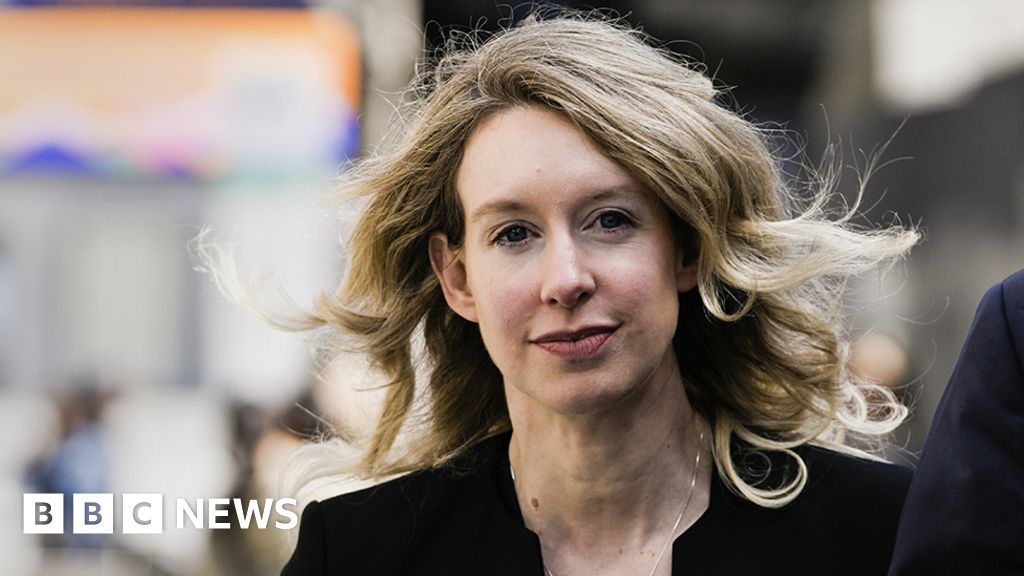Elizabeth Holmes Delays Start Of Prison Sentence

Holmes has avoided the start of her 11-year prison term with a last-minute manoeuvre
Disgraced Theranos founder Elizabeth Holmes has delayed the start of her more than 11-year prison sentence after lodging another appeal.
Holmes, 39, was convicted last year on four counts of fraud linked to her failed blood testing start up.
But under the 9th US Circuit appeals court rules, Holmes' surrender has been automatically delayed until the court decides on her latest bid.
It is so far unclear when that ruling will come.
Earlier this month, she appealed to the court to remain free on bail while a challenge to the original conviction is considered.
But this was rejected by US district judge Edward Davila, who said Holmes had failed to prove the appeals process would lead to a new trial.
Then, late on Tuesday, Holmes' attorneys appealed that ruling to the 9th Circuit in San Francisco - and that court's rules mean Holmes' can remain free on bail until the appeal is heard.
In the eleventh-hour move, Holmes' team argued Judge Davila's decision contained "numerous, inexplicable errors".
Her lawyers said this included referring to "patient fraud counts" even though Holmes was acquitted on charges that she defrauded Theranos patients.
The same legal manoeuvre was used successfully by Ramesh "Sunny" Balwani, Ms Holmes' co-conspirator and former business and romantic partner.
He was able to postpone his sentence by about a month. Balwani ultimately exhausted his options and reported to a federal prison in San Pedro, California, earlier this month to begin his nearly 13-year sentence.
If Holmes' appeal is unsuccessful, the US District Court of California has recommended the mother of two serve her time at a federal prison camp in Bryan, Texas, that allows for family visitation. But her ultimate destination has not been confirmed.
Holmes was once hailed as the "next Steve Jobs" and said to be the world's youngest self-made billionaire.
She launched Theranos after dropping out of Stanford University, boasting a new blood-testing device that was purportedly able to run a multitude of tests from just a few drops of blood. But the start-up fell apart in 2018 after it was revealed its technology did not work.
Holmes, who was found guilty of four counts of fraud last January, told the court at the time she felt "deep pain" for those who were misled.
From Chip War To Cloud War: The Next Frontier In Global Tech Competition
The global chip war, characterized by intense competition among nations and corporations for supremacy in semiconductor ... Read more
The High Stakes Of Tech Regulation: Security Risks And Market Dynamics
The influence of tech giants in the global economy continues to grow, raising crucial questions about how to balance sec... Read more
The Tyranny Of Instagram Interiors: Why It's Time To Break Free From Algorithm-Driven Aesthetics
Instagram has become a dominant force in shaping interior design trends, offering a seemingly endless stream of inspirat... Read more
The Data Crunch In AI: Strategies For Sustainability
Exploring solutions to the imminent exhaustion of internet data for AI training.As the artificial intelligence (AI) indu... Read more
Google Abandons Four-Year Effort To Remove Cookies From Chrome Browser
After four years of dedicated effort, Google has decided to abandon its plan to remove third-party cookies from its Chro... Read more
LinkedIn Embraces AI And Gamification To Drive User Engagement And Revenue
In an effort to tackle slowing revenue growth and enhance user engagement, LinkedIn is turning to artificial intelligenc... Read more

